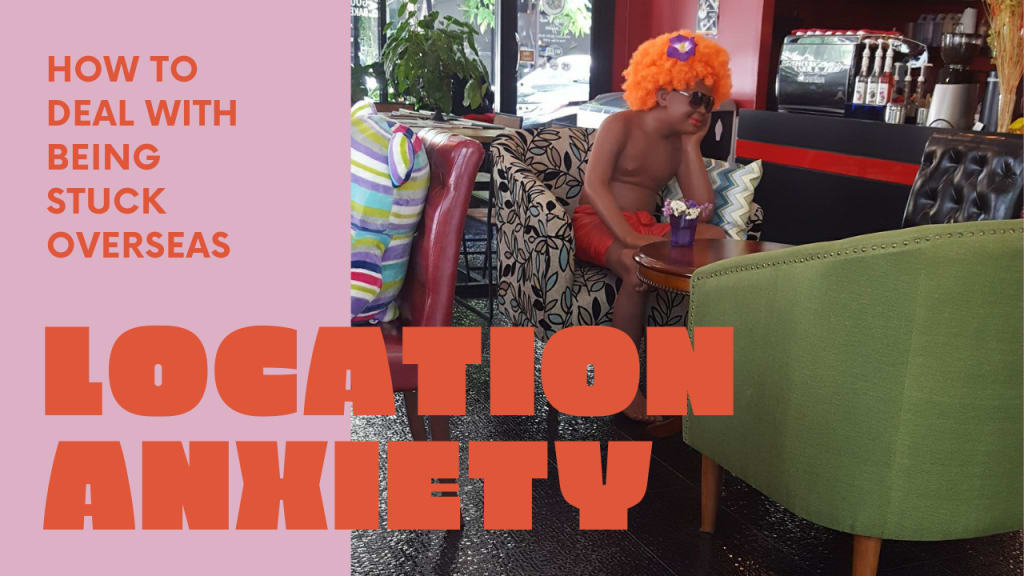Location Anxiety: How to Deal with being stuck overseas during a Pandemic
There are many people who live nowhere in particular, this is how they deal with the struggle

What do we do when every country bans that one thing that our identity revolves around - ‘non-essential travel?’ Most digital nomads choose to live life on the move. A major part of our existence is shaped by an ever-changing environment. The fear of staying put in one particular location for longer than expected, hinders our nomadic tendencies.
Looking for a way to deal with the downtime over the holidays? Check out how high rollers spend their time
In 2020 nomads found themselves “caged” in a foreign land far longer than anticipated coupled with health and political instabilities. At the outset of the Coronavirus pandemic, most countries went under immediate lockdown and international flights were canceled. Digital nomads, even this summer of 2020, have found themselves stranded and unsure when they can resume their wandering ways.

What are the downsides of being stuck amidst foreign locked borders?
During this Covid-19 pandemic, as the number of infected cases rise, so does the negative news on the internet. Those away from their families are stressed regarding the health and safety of their loved ones. Although several nomads are accustomed to this quarantined way of life, they also have to face undeniable struggles in order to survive global uncertainties.
Expiring visas and airport hassles
Most nomads travel on tourist visas granted for a limited number of months. During Covid-19, countries started going under lockdown, leaving tourists in two minds whether to leave or stay in their current location. As Vietnam suspended international flights, my colleague decided to fly back to her home country. She had to go through endless waiting lines and face innumerable health screenings at the airport, only to end up serving a two-week quarantine back in her country. The ones who decided to stay put, had to deal with expiring visas and airport hassles. Although embassies may extend the visas for a little longer in times of such crisis, it is advisable to check if quality healthcare facilities are available to foreigners at your current location before extending your stay.
Limited internet access and network connectivity
Digital nomads are dependent on the internet for the majority of their work. But since certain hostels and homestays in remote locations don’t offer internet access, nomads resort to the wi-fi from nearby coffee shops and co-working spaces. While on a road trip to Kashmir, India, a few of my friends were stranded during political struggles. The state had shut down internet access and suspended mobile network services for weeks, this caused major panic among families that weren’t able to contact their loved ones. Natural calamities may also lead to limited internet access and network connectivity, causing disadvantage to freelancers who require extensive research for their articles and daily projects. It is recommended to carry a data device or wi-fi dongle and hope that serves you during emergencies.
Cancelled retreats
Many nomads love to jet around the world in search of freedom and new experiences. They enroll themselves in personal growth and wellness retreats to learn new skills to expand their creativity and productivity. The global pandemic resulted in cancelled retreats and what seems like limitless adventure could feel like endless entrapment. However, most nomads possess an adaptive mindset; from being stranded during natural disasters to falling sick in remote locations, they have learned to acclimatize to extreme changes. Most of them are quick to learn the language and culture of the places they temporarily reside in and this allows them to ask and receive help from the locals in times of need.

Loneliness and decline in mental health
Nomads are always on the move and end up making a lot of friends, they are so busy creating memories along the way that they miss out on creating long-term friendships. When stranded in a place for too long, they tend to crave intimacy and failing to receive that could be tough. With borders sealed and family meetings postponed during a pandemic, separation anxiety may lead to a decline in mental health and cause strained relationships. Nomads may start to feel disconnected from their loved ones and this unprocessed grief can have a traumatic impact, resulting in depression, anxiety and a sense of loneliness. It is not uncommon for nomads to experience feelings of abandonment and loneliness during times of global uncertainty.
How are nomads adapting better amid quarantine and isolation?
Work from home
The pandemic has made the world realise that working from home is very feasible for a lot of professions and companies such as Twitter have announced ‘work from home forever’. Digital nomads are well equipped to handle work from home and most nomadic entrepreneurs don’t even have to spend money to lease office spaces as their team also works online. They almost never physically meet their clients or colleagues and are able to enjoy the utmost personal space. This allows them to naturally practise social distancing and distance themselves from infections.
Regular paychecks
When a country experiences economic depressions or political repressions, nomads may still receive regular paychecks and not have to worry about losing their fixed jobs. We don’t usually rely on only one source of income and take up several freelance gigs as and when required. The payment structure is mostly online and that strikes out any excuses for delayed payments. We may not enjoy job security that comes with attractive salary packages, paid leaves and medical insurances, but in exchange we do enjoy flexible work timings and the freedom to benefit from multiple revenue streams.
Healthy and mindful lifestyle
Nomads are ruthlessly minimal because of their persistent movement. They prefer to spend more on adventures and experiences rather than on costly possessions. They learn to appreciate a high quality of life with a low cost of living and practise mindful food and sleep habits. As nomads, most of us tend to cook our own meals and avoid eating processed foods. We understand that a healthy lifestyle is the key to long term productivity. Nomadic freelancers manage to maintain a work-life balance that include activities such as meditation and personal growth programs that enhance their quality of living,
Personal freedom and self expression
Since a nomad’s personal identity isn't tied to a specific company, they may have several job titles which let them cultivate an array of personal and professional skills. We are able to develop a stronger sense of self identity and adapt to career changes. When the whole world is forced to stay indoors, there is little scope of personal freedom and self-expression, this may sometimes lead to unnecessary arguments and frustration with families, friends, or strangers that are quarantined together. Nomads who are away from home fill this void through voice and video calls and learn to appreciate their interactions however limited.
About the Creator
Jack Spade
Writing on streamers and slots for the thrill of the action, ma'am.






Comments
There are no comments for this story
Be the first to respond and start the conversation.